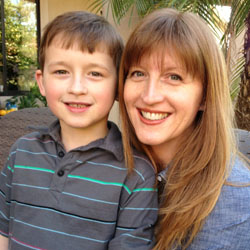By Krysty Doc
 Four years ago, I unexpectedly found myself in the same situation you are now in—trying to make sense of the hearing loss diagnosis we had just received from a pediatric audiologist. I know as you sit and read this letter you find yourself in a place that you never imagined to be. At the time of my son’s diagnosis, both my husband and I had typical hearing (I have since been diagnosed with hearing loss and now wear hearing aids) and neither of us had any knowledge of hearing loss or contact with families who had children with hearing loss.
Four years ago, I unexpectedly found myself in the same situation you are now in—trying to make sense of the hearing loss diagnosis we had just received from a pediatric audiologist. I know as you sit and read this letter you find yourself in a place that you never imagined to be. At the time of my son’s diagnosis, both my husband and I had typical hearing (I have since been diagnosed with hearing loss and now wear hearing aids) and neither of us had any knowledge of hearing loss or contact with families who had children with hearing loss.
The first few months after our son’s diagnosis were an emotional time. Not only did we need to deal with this diagnosis of hearing loss emotionally, but we also had to make decisions about what the next steps would be with regards to having our son fitted for hearing aids, and moving ahead with speech therapy and what education approach to choose. A sense of urgency was added to these decisions as our son was three years old when we received his diagnosis, which meant he had already missed so much exposure to sound.
As overwhelming as things seem right now, your child’s hearing loss will eventually fit in alongside everything else that you deal with as a parent. Adapting to your child’s hearing loss is all about putting one foot in front of the other. There will be some bumps along the way as you adapt to new situations and new people, but with each new challenge you will only gain strength and knowledge.
As I reflect upon the past four years and where our hearing loss journey has taken us, I would like to share some guiding principles that have helped us along the way.
DO try to stay positive, because while it may not seem so at the moment, the identification of your child’s hearing loss is a positive step. As hard as it may be, tell your child how lucky he is to wear hearing aids or a cochlear implant so that his ears will get the help they need. Starting out with a positive attitude is one of the best things you can do. Your child looks towards you for feedback and cues as to how he should respond to this change in his life. Hearing aids or cochlear implants should be viewed as what they are: instruments to amplify sound so that he can hear better and participate more fully in family and school life. If he sees you become tense or embarrassed about his hearing devices in public, he might begin to think you are embarrassed by him.
DON’T change your parenting style. Try to keep things as normal as possible. Many parents question how a diagnosis of hearing loss will change their parenting. The answer is that a hearing loss will change your parenting somewhat, but not as much as you think it will. Most of the changes will be centered on the additional responsibilities of having a child with hearing loss: maintaining hearing equipment, advocating for your child’s needs, attending IEP meetings, and scheduling speech therapy sessions.
What won’t change is the support your child will need during this time of transition. She needs to know that your relationship and her place in the family will remain the same. Give her extra hugs when you know she needs them, but don’t fall into the trap of over-compensating for her hearing loss by treating her differently. She should have just as many responsibilities and expectations, both at home and at school, as your other children.
DO take the time to play and talk a lot to your child. This point might be obvious, but life can become hectic when you are running around from specialist to specialist. Engage your child in conversations. Use big words and small words. Take the time to explore new words and ideas together. Sing songs. Read a lot of books. Extend his thinking. Go on nature walks. Give him lots of opportunities to explore with all five senses. Don’t worry about him “getting” everything; at this point it’s all about exploration. The richer the language he is exposed to, the greater connections he will make about the world around him.
DON’T Google obsessively. While it is important to gather additional information about your child’s diagnosis, be careful not to go overboard. As you begin to read more about hearing loss, whether it is a new research finding or advice on a parent’s blog, it is important to recognize that your child’s hearing loss is unique. There are numerous variables that affect your child and how she will respond to various interventions, such as: the age she was when hearing loss was diagnosed; the degree of her hearing loss and the quality of residual hearing she has unaided; and her personality, whether she is engaged, curious, active or more shy and withdrawn.
Ask your audiologist for some reliable websites to start with. The AG Bell Listening and Spoken Language Knowledge Center is a great place for families to start their information search. Knowing that you are not alone can be helpful. Search for “Blogs from the Community” on the Knowledge Center to read stories of other parents and families.
DO connect with other parents whose children have hearing loss. Discovering your child has a hearing loss can be an isolating experience. You may not have had the time to connect with other families of children with hearing loss, while at the same time you may feel disconnected from your friends who have children with typical hearing. Many hospitals often offer support programs that can help you connect with other families. Also, your audiologist might be able to offer suggestions on how to meet families in your area. If you live in an isolated area, you can always join groups on Twitter, Facebook, and LinkedIn that offer virtual networks of families who are dealing with hearing loss. The AG Bell private Facebook group offers a safe and supportive place to connect, share and learn from families on a similar journey. Every day, there are lively discussions and uplifting stories. Further, AG Bell currently has chapters in 30 states, made up of volunteers passionate about listening and spoken language.
DON’T exclude siblings from the process. Depending on the ages of your other children it can be difficult for siblings to adjust to having a brother or sister with a hearing loss. It is important to remember to include your other child (or children) and provide them with information that is age appropriate. As you will most likely be spending a great deal of time in the beginning heading out to appointments, it may be a nice idea to try to spend some one-on-one time with your other child. It is easy for siblings to get frustrated when they see their brother or sister receiving a great deal of attention and they don’t understand why.
DO teach your child to self-advocate. This can start as soon as your child receives their hearing aids/cochlear implants. Let him know it is important to tell a grown-up if something is wrong with his hearing equipment. Practice at home by taking a battery out of his hearing equipment before you have him put it on. Give him a couple of minutes to see if he notices anything different. If he doesn’t say anything, say, “Surprise! I took your battery out. Do you notice anything different about your right ear?”
Let him know that it is okay to ask someone to repeat what they are saying if he didn’t hear them the first time. There will be times when the speaker is either talking too quietly or background noises are too overwhelming. Provide him with language he can use, such as saying, “Excuse me, can you please tell me that again,” so that he can begin to feel comfortable. This will let people know that your child is not ignoring them, but just didn’t hear them.
DON’T let what others think influence your decisions. Many parents struggle with pretending their child is not different, and they don’t access the therapies and devices their child needs. When it comes to successfully developing listening and spoken language, time is of the essence. The earlier you have your child fit with hearing aids, set up speech therapy, or pursue a cochlear implant, the better chance your child has to thrive and reach his full potential.
As you begin your journey remember to take your child’s hearing loss one day at a time. You will have good days and bad days; it’s a growing process for everyone. Take time to educate others about hearing loss. There are many misconceptions out there; work to overcome some of them. Remember to breathe and to find time to relax both together as a family and by yourself. Have faith in your child. Children are hardwired to grow and develop, and that is what your child will continue to do if you give them the time, space, and support they need.
